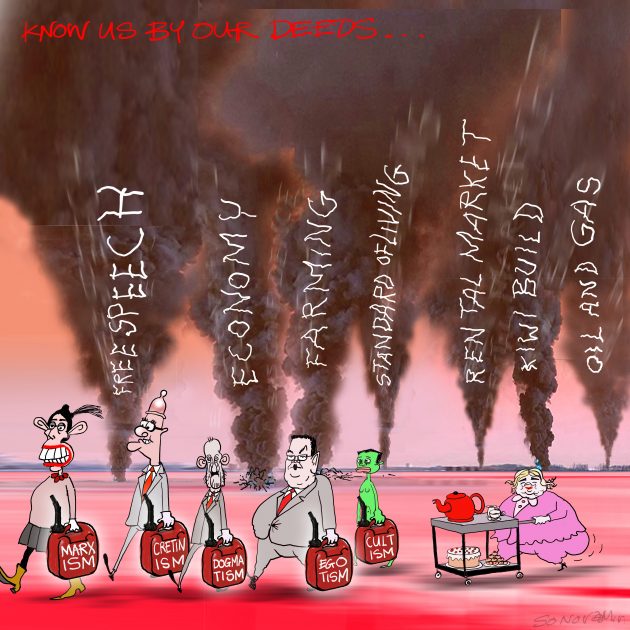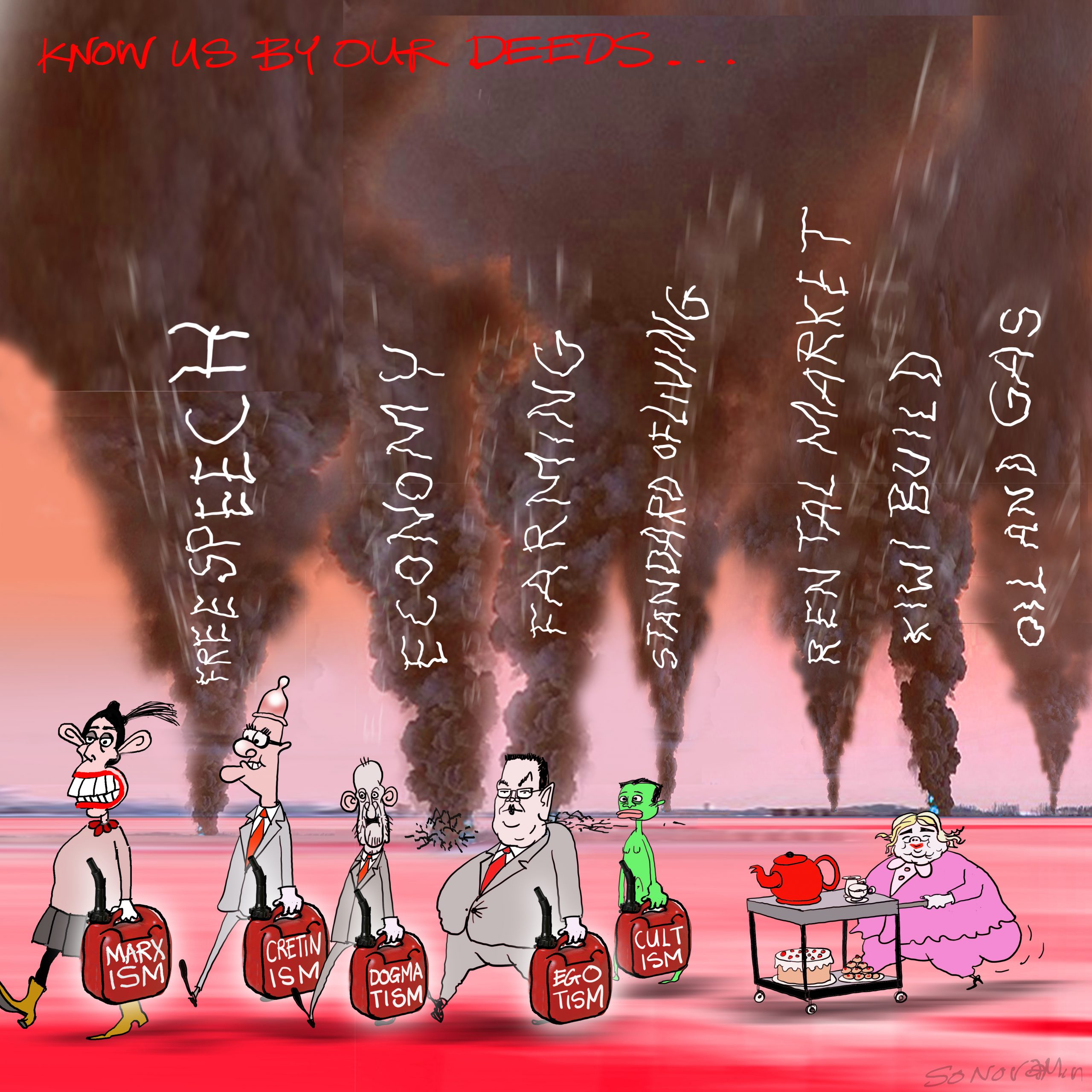David Theobald
Pragmatism vs ideology. We are certainly ‘ruled’ here in New Zealand by the latter. Our Government is ideologically driven in virtually all it does. I have long thought that those at the levers of power start behind the eight ball on account of their lack of intellectual horsepower. They fill this void with a slavish adherence to an ideology; an ideology I find abhorrent.
Only this week that natural successor to Bertrand Russell, Julie Anne Genter, came up with new madness concerning cyclists and those infernal scooters. Scooters will still be allowed on pavements but they will be limited to 15kph, so that’s alright (try running at 15kph). How is this going to be policed? Nevertheless, it is the least daft of her ideas currently up for feedback.
Prize for the most stupid goes to the ‘right’ of cyclists to undertake slower or stationary cars on the left at junctions – even those vehicles in a ‘turn left only’ lane. The velocipedes are then permitted to go straight ahead; how to engineer multiple accidents from an Associate Minister of Transport who doesn’t even possess a driving licence.
But, I digress. We have been labouring (pun intended) under the worst ‘ideology over pragmatism’ decision for a couple of years following the infamous ‘Captain’s Call’ to shut down the oil and gas industry. This is closely followed by the barmy ‘Net Carbon Zero by 2050’. The only input to this appears to have been when Jacinda Ardern interrupted a visit from a foreign dignitary to accept a petition from several hundred Green activists.

I’m sorry, this woman just does not have the intelligence or real world experience to hold down the job she currently holds. Oh, that she had access to, and more importantly the willingness and ability to comprehend, the below sort of analysis which refers to the only other country (to my knowledge) to have committed to this Net Carbon Zero by 2050 craziness. The UK’s trajectory to this insanity was Theresa May’s parting gift to the nation and, worryingly, Boris has not only subscribed to it, he has doubled down on it somewhat bringing the dates of compliance on parts of it closer.
The article below was written by Matt Ridley. He sits in the House of Lords (probably irrelevant) and knows what he is talking about. The article outlines the practical effects of an energy policy aimed at a ludicrous ideological and realistically unreachable goal. Fancy a read, Prime Minister?
The Government’s energy policy could cripple global Britain
[…] Britain has uniquely legislated to reach net-zero carbon dioxide emissions in 2050, which means going cold turkey on the 85% of our energy that currently comes from gas, oil and coal. That means finding ways to run not just the electricity grid, which is about 20% of our energy, without net emissions, but all our heating, transport and industrial processes too. […] reputable estimates put the cost at around £3 trillion in the absence of any breakthrough in nuclear fusion or carbon capture.
The cost of some existing policies is already being passed on to consumers at the rate of £10 billion a year. Subsidies for wind, solar and biomass electricity have made household electricity prices about 35% higher than they would otherwise have been, according to the government’s own estimates. The prices paid by businesses – which are also passed on to consumers in the prices of products and services – are more like 60% higher. Industrial electricity prices here are among the highest in the world. That is a big drag on competitiveness […]
The main beneficiaries from these policies are the renewable energy industry, and the government itself, which charges VAT on top of these subsidies.[…]
The world, and Asia in particular, is electrifying more and more processes, because it is such a versatile and efficient source of power, but we and the EU seem to be moving in the other direction. One of the reasons for the fall in electricity consumption is the emigration of industry to cheaper locations. […] No wonder factories are moving. We have already lost our aluminium industry and much of our steel industry. We still need these materials but we import them from countries with higher emissions, which makes no sense.[…]
Energy is not just another raw material, like paper or cement. It’s the very source of wealth.[…] High energy costs are extremely dangerous for an economy over time. They become embedded in the costs of the capital they create and they deter experimental innovation. […]
In the past few weeks, the government has made a string of announcements relating to energy, all attempting to appease the green lobby. Every single one will raise costs to consumers but reward special-interest lobbies of crony capitalists […]
[…] In the case of transport, fuel tax is already exceedingly high in this country, leading many hauliers who come here from the continent to carry extra diesel tanks so they don’t have to refuel while here. Insisting on biofuels will increase the underlying cost and that will be multiplied by Fuel Duty (is that the Chancellor’s cunning plan?). In any case, it takes almost as much diesel and gas to plant, fertilise and harvest a crop of wheat as you get ethanol out of it.
Britain deludes itself that it is setting an example to the world by decarbonising faster. But China, India and even Germany are still building hundreds of coal-fired power stations. The UK is unlikely to be able to manufacture attractive high-value exports if its energy costs are higher than the competition.
[…] The experience of Scotland clearly shows that even when government colludes with the renewables industry, there is almost no local employment in the manufacture of wind turbine parts, because renewables are already expensive, and insisting on substantial local content drives up costs still further. Wind turbines will not be made in the United Kingdom, unless labour costs are driven down, and the only way to do that is to force down living standards. Does that sound like good politics to you? Me neither.
The purpose of decarbonisation is to alter the climate for the better. Yet nobody in their right mind thinks that net zero emissions will prevent wet winters and flooding. […]
Our energy policy is centrally planned but it resembles the practice under fascist regimes rather than socialist ones, because it rewards favoured private firms. […]
I fear that The Conservatives have fallen into the error of thinking of the nation as a business. This is both illiberal and makes the classic mistake of answering to the interests of producers rather than consumers. Businesses are command economies on the inside (which is why business people generally speaking do not make good politicians). But populations and the nation states they create to represent their common interests are not businesses: they are voluntary collaborations. The green agenda, as with any ‘crisis’, gives a pretext for the creation of a command economy. If we continue down this road it will not only make us uncompetitive, but also, like all the other corrupt and inefficient command economies before us, very, very dirty.
globalvisionuk.com/the-governments-energy-policy-could-cripple-global-britain/

If you enjoyed this BFD article please consider sharing it with your friends.

